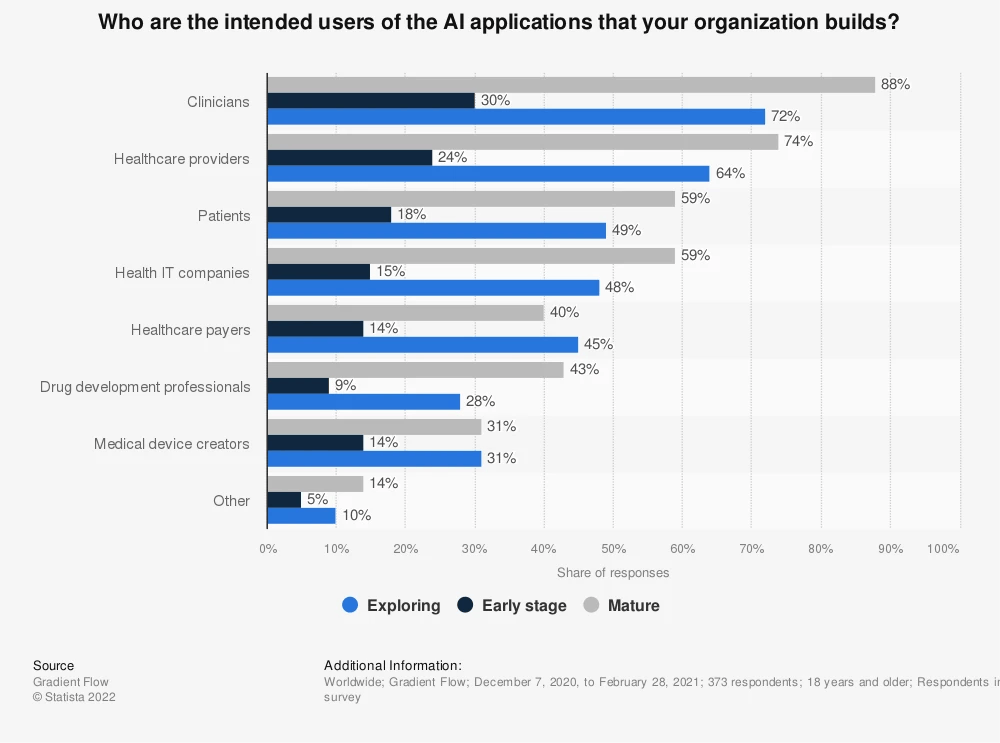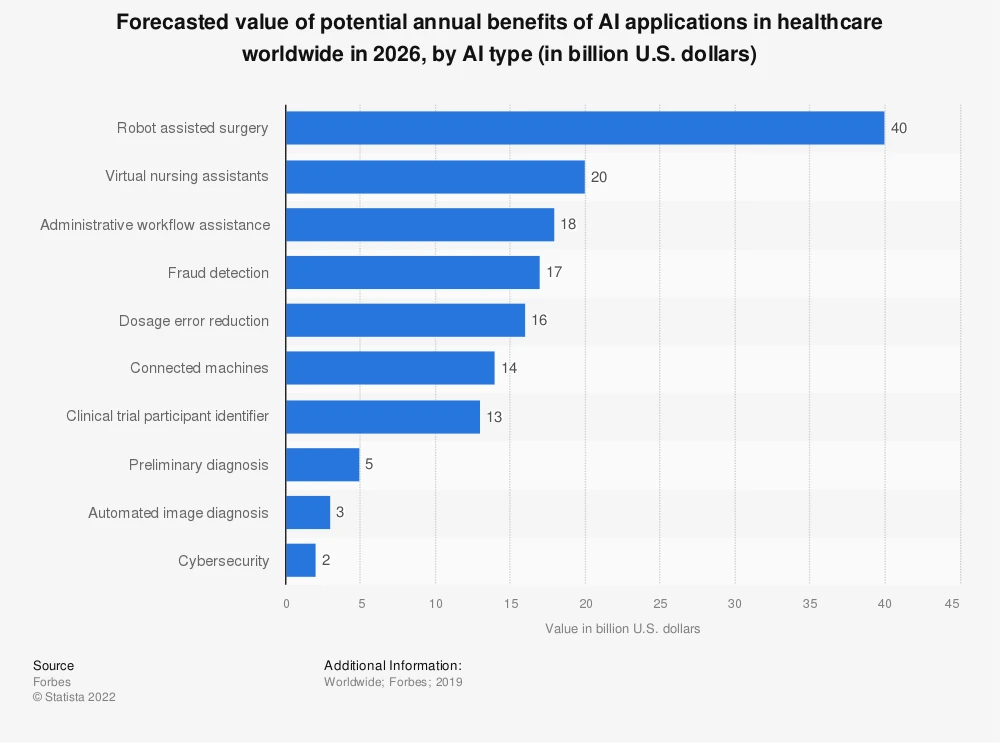Artificial Intelligence has increasingly permeated our lives. While it is at various maturity levels across industries, new breakthroughs in computer vision, natural language processing and machine learning have created a never-seen enthusiasm. AI in healthcare promises to be a game-changer, bringing forth a future where clinical and administrative processes become more effective and efficient.
Across healthcare, clinicians are at the forefront of this evolution. A 2022 report by Gradient Flow shows that clinicians lead all other healthcare stakeholders in exploring and applying AI to their work. At the other end of the spectrum, medical device and drug manufacturers are increasing their investments to improve the effectiveness and efficiency of research and development. Beyond the obvious cost and productivity advantages, it is key to note that all stakeholders must integrate AI within established regulatory frameworks.

AI in care delivery
AI in medical care brings with it numerous benefits that have the potential to revolutionize healthcare.
- Diagnosis accuracy: AI algorithms analyze vast amounts of patient data and detect patterns that may not be readily noticeable otherwise. This leads to more accurate diagnoses and enables healthcare providers to start treatment earlier, improving patient outcomes. Furthermore, AI in healthcare is actively revolutionizing medical imaging. As machine learning algorithms continue to advance, AI in healthcare rapidly evolves, enabling highly sophisticated analysis of medical images. This enhanced capability plays a crucial role in facilitating the early detection of various diseases and abnormalities, thereby significantly improving patient outcomes and the overall quality of medical care.
- Precision medicine: One area where AI is expected to have a significant impact is in the field of precision medicine. AI algorithms can identify the most effective treatment options for individual patients by analyzing vast patient data, including genetic information. This will lead to more personalized and targeted therapies, improving patient outcomes and reducing healthcare costs.
- Telemedicine: AI is also expected to play a significant role in telemedicine. With the rise of remote healthcare consultations, AI-powered virtual assistants can provide round-the-clock support to patients, improving healthcare access, particularly for individuals in remote areas or those with limited mobility.
AI in medical devices and technology
The integration of AI in healthcare is driving the creation of groundbreaking medical devices and cutting-edge technologies poised to fundamentally transform the landscape of healthcare delivery. These innovations hold the potential to enhance diagnoses, streamline treatment processes and ultimately redefine the way healthcare is administered, making AI a driving force behind the evolution of the field.
- Wearables and implants: One area of AI integration is in wearable devices and implants - in both at-home and at-provider site settings - that use a monitor and analyze patient data in real-time by tracking vital signs, detecting abnormalities early and providing just-in-time personalized care recommendations.
- Operating room: Another area where we actively use AI in medical devices is during surgeries, where surgeons perform complex procedures with greater precision and control, reducing the risk of complications and improving surgical outcomes.
- Onsite drug inventory: AI is also emerging as a go-to game changer where algorithms look for opportunities to optimize drug inventory management devices across multiple locations at a provider site, helping optimize losses due to waste, abuse and fraud.
AI in health insurance
Healthcare payers require a frictionless flow of information between sales and service channels and must look for holistic solutions rather than point solutions.
- Claims processing: AI algorithms are emerging to analyze medical records and claims data, ensuring services provided are accurately coded and reimbursed, reducing the chances of errors and delays in the billing process, improving cash flow for healthcare providers and streamlining operations for payers. It can potentially halve the claims processing speed and increase member satisfaction by 20%.
- Payment integrity: AI in the health insurance industry is also being applied to transform the traditional rules-based mechanism of analyzing claims for patterns and anomalies in claims data and flagging suspicious claims for further investigation for fraud, waste, abuse and coordination of benefits. Further, it improves false positives from triage efforts while reducing true negatives from being missed, thereby saving a remarkable portion of administrative costs involved as well as medical payouts.
- Group underwriting: AI also has the potential to improve the accuracy of insurance underwriting. By training over vast amounts of data, including medical records and de-identified genetic information, AI algorithms can assess risks for a group more accurately and tailor insurance policies.
AI in drug research and discovery
- Drug discovery: AI algorithms are being incorporated to analyze molecular structures and predict the efficacy of potential drugs, reducing the time and cost required for drug development. This increases the chances of success in clinical trials.
- Drug repurposing: By analyzing data from clinical trials and electronic health records, AI in healthcare is being tasked with identifying potential uses for drugs already in the market, speeding up drug discovery and reducing the risk of developing new drugs from scratch.
- Drug manufacturing: Drug manufacturing has seen several interventions where AI is applied to reduce development time and waste. AI integrated with process development data can provide optimal manufacturing parameters or scale-up processes. Drug manufacturers are creating advanced process controls by combining AI with real-time sensor data to predict the progression across the chemical, physical and biological transformations occurring in the manufacturing process. Real-time production monitoring systems integrate AI to monitor product quality and packaging.
It is forecasted that potentially $150 billion in benefits exist from the application of AI in healthcare.

As technology advances, we can expect AI in healthcare to get even more exciting. One area that touches all stakeholders is administrative tasks, where AI in healthcare will see significant application to improve administrative efficiency and accuracy. Natural Language Processing (NLP) algorithms analyze medical records, extract relevant information and complete administrative requirements for patients, providers, payors, drug manufacturers, medical device companies and intermediaries. An estimated 5-10% of the administrative effort will be impacted by AI, thereby reducing the time and effort required for non-clinical tasks and freeing up capital for patient care.
From personalized treatment plans to more accurate diagnoses, AI in healthcare will provide the platform to evolve to the next advanced state. While these advancements will also bring challenges and ethical considerations that must be carefully addressed, implementing proper regulations and safeguards will allow AI to be used responsibly, maximizing benefits and minimizing risks.




